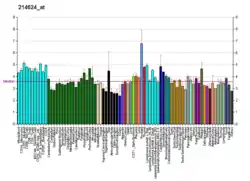UPK1A
Uroplakin-1a is a protein that in humans is encoded by the UPK1A gene.[5][6][7]
The protein encoded by this gene is a member of the transmembrane 4 superfamily, also known as the tetraspanin family. Most of these members are cell-surface proteins that are characterized by the presence of four hydrophobic domains.
The proteins mediate signal transduction events that play a role in the regulation of cell development, activation, growth and motility. This encoded protein is found in the asymmetrical unit membrane (AUM) where it can complex with other transmembrane 4 superfamily proteins.
It may play a role in normal bladder epithelial physiology, possibly in regulating membrane permeability of superficial umbrella cells or in stabilizing the apical membrane through AUM/cytoskeletal interactions.[7]
References
- GRCh38: Ensembl release 89: ENSG00000105668 - Ensembl, May 2017
- GRCm38: Ensembl release 89: ENSMUSG00000006313 - Ensembl, May 2017
- "Human PubMed Reference:". National Center for Biotechnology Information, U.S. National Library of Medicine.
- "Mouse PubMed Reference:". National Center for Biotechnology Information, U.S. National Library of Medicine.
- Lobban ED, Smith BA, Hall GD, Harnden P, Roberts P, Selby PJ, Trejdosiewicz LK, Southgate J (Dec 1998). "Uroplakin gene expression by normal and neoplastic human urothelium". Am J Pathol. 153 (6): 1957–67. doi:10.1016/S0002-9440(10)65709-4. PMC 1866332. PMID 9846985.
- Yuasa T, Yoshiki T, Isono T, Tanaka T, Hayashida H, Okada Y (Sep 1999). "Expression of transitional cell-specific genes, uroplakin Ia and II, in bladder cancer: detection of circulating cancer cells in the peripheral blood of metastatic patients". Int J Urol. 6 (6): 286–92. doi:10.1046/j.1442-2042.1999.00064.x. PMID 10404304. S2CID 43597402.
- "Entrez Gene: UPK1A uroplakin 1A".
Further reading
- Berditchevski F (2002). "Complexes of tetraspanins with integrins: more than meets the eye". J. Cell Sci. 114 (Pt 23): 4143–51. PMID 11739647.
- Yu J, Lin JH, Wu XR, Sun TT (1994). "Uroplakins Ia and Ib, two major differentiation products of bladder epithelium, belong to a family of four transmembrane domain (4TM) proteins". J. Cell Biol. 125 (1): 171–82. doi:10.1083/jcb.125.1.171. PMC 2120008. PMID 8138569.
- Wu XR, Medina JJ, Sun TT (1996). "Selective interactions of UPIa and UPIb, two members of the transmembrane 4 superfamily, with distinct single transmembrane-domained proteins in differentiated urothelial cells". J. Biol. Chem. 270 (50): 29752–9. doi:10.1074/jbc.270.50.29752. PMID 8530366.
- Ogawa K, Johansson SL, Cohen SM (1999). "Immunohistochemical analysis of uroplakins, urothelial specific proteins, in ovarian Brenner tumors, normal tissues, and benign and neoplastic lesions of the female genital tract". Am. J. Pathol. 155 (4): 1047–50. doi:10.1016/S0002-9440(10)65206-6. PMC 1867018. PMID 10514386.
- Kageyama S, Yoshiki T, Isono T, et al. (2003). "High expression of human uroplakin Ia in urinary bladder transitional cell carcinoma". Jpn. J. Cancer Res. 93 (5): 523–31. doi:10.1111/j.1349-7006.2002.tb01287.x. PMC 5927031. PMID 12036448.
- Tu L, Sun TT, Kreibich G (2003). "Specific heterodimer formation is a prerequisite for uroplakins to exit from the endoplasmic reticulum". Mol. Biol. Cell. 13 (12): 4221–30. doi:10.1091/mbc.E02-04-0211. PMC 138628. PMID 12475947.
- Strausberg RL, Feingold EA, Grouse LH, et al. (2003). "Generation and initial analysis of more than 15,000 full-length human and mouse cDNA sequences". Proc. Natl. Acad. Sci. U.S.A. 99 (26): 16899–903. doi:10.1073/pnas.242603899. PMC 139241. PMID 12477932.
- Grimwood J, Gordon LA, Olsen A, et al. (2004). "The DNA sequence and biology of human chromosome 19". Nature. 428 (6982): 529–35. doi:10.1038/nature02399. PMID 15057824.
- Yuasa T, Yoshiki T, Isono T, et al. (2004). "Molecular cloning and expression of uroplakins in transitional cell carcinoma". Bladder Disease, Part A. Adv. Exp. Med. Biol. 539. pp. 33–46. doi:10.1007/978-1-4419-8889-8_3. ISBN 978-1-4613-4707-1. PMID 15088894.
- Gerhard DS, Wagner L, Feingold EA, et al. (2004). "The status, quality, and expansion of the NIH full-length cDNA project: the Mammalian Gene Collection (MGC)". Genome Res. 14 (10B): 2121–7. doi:10.1101/gr.2596504. PMC 528928. PMID 15489334.
- Hall GD, Weeks RJ, Olsburgh J, et al. (2005). "Transcriptional control of the human urothelial-specific gene, uroplakin Ia". Biochim. Biophys. Acta. 1729 (2): 126–34. doi:10.1016/j.bbaexp.2005.04.004. PMID 15913809.




